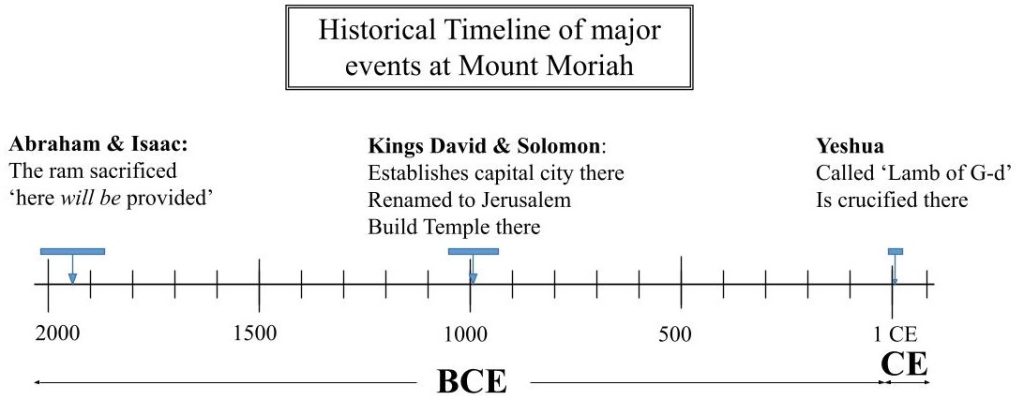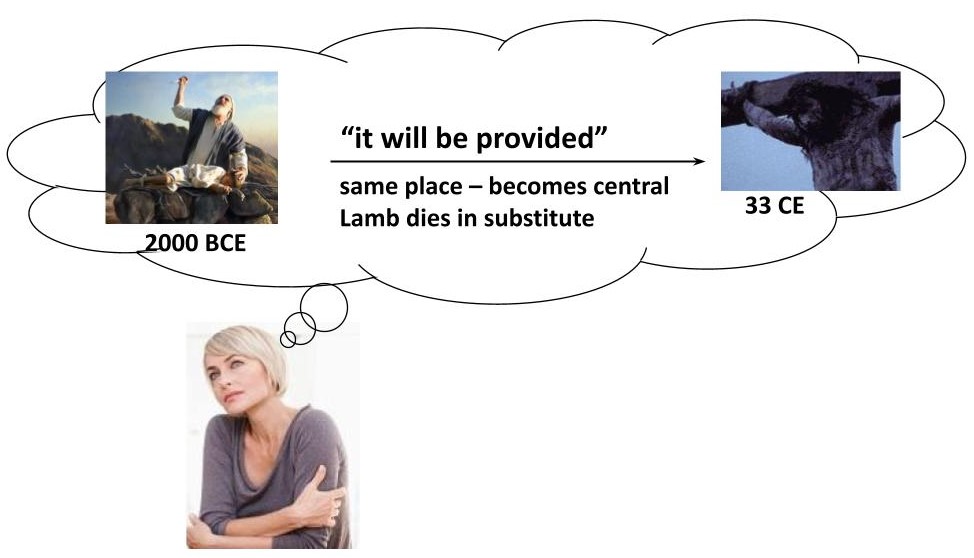We saw how Abraham had received the prize of Righteousness. We also noted the connections between Passover (Pesach) and Jesus (Yeshua) of Nazareth, learning that the re-discovery of Yeshua’s Jewish root is proving fascinating for both Jews and Christians, resulting in shared Sedar meals.
Genesis 22 – Abraham Tested with Sacrifice
The Torah account of the testing of Abraham in the sacrifice of his son Isaac (Yitzchak) builds on this Yeshua-Torah relationship right from the Genesis 22 text. The complete Genesis 22 account is here. The unfolding relationship of this account to Jesus (Yeshua) is explored below.
G-d initiated the ordeal by giving Abraham a bizarre command:
G-d said, “Take your son, your only son, whom you love, Yitzchak (Isaac); and go to the land of Moriyah (Moriah). There you are to offer him as a burnt offering on a mountain that I will point out to you.” (Genesis 22:2)
Though many through the ages have wondered why G-d gave such a drastic order, Abraham did not delay but rather…
Avraham (Abraham) got up early in the morning, saddled his donkey, and took two of his young men with him, together with Yitzchak (Isaac) his son. He cut the wood for the burnt offering, departed and went toward the place God had told him about. On the third day, Avraham raised his eyes and saw the place in the distance. (Genesis 22:3-4)
While traveling for three days Isaac was as good as dead in Abraham’s mind since he knew what was to happen once they reached Moriah. Upon arriving, Abraham…
They came to the place God had told him about; and Avraham built the altar there, set the wood in order, bound Yitz’chak his son and laid him on the altar, on the wood. Then Avraham put out his hand and took the knife to kill his son. (Genesis 22:9-10)
It is at this point in the account that a dramatic rescue takes place…
But the angel of Adonai called to him out of heaven: “Avraham? Avraham!” He answered, “Here I am.” He said, “Don’t lay your hand on the boy! Don’t do anything to him! For now I know that you are a man who fears God, because you have not withheld your son, your only son, from me.” Avraham raised his eyes and looked, and there behind him was a ram caught in the bushes by its horns. Avraham went and took the ram and offered it up as a burnt offering in place of his son. (Genesis 22:11-13)
At the last moment a ram substituted In Isaac’s place. The ram was offered as a burnt offering instead of Isaac. The ram died so that Isaac could live.
Now there is another strange twist in this unusual account. Notice what happens next:
And Avraham called the name of that place Hashem Yireh: as it is said to this day, In the mount of Hashem it shall be provided. (Genesis 22:14)
When naming the place, we would expect that Abraham would look back to that moment when G-d provided the ram in place of his son. But instead it looks forward into the future (‘it shall be provided’) rather than to the recent past when the ram had been provided.
Why is a name given to this place that is future-looking rather than looking back to the saving of Isaac?
Mount Moriah and Jerusalem
Mount Moriah becomes the place where the Temple is built 1000 years later by Solomon. We see this later in the Tanakh
Then Shlomo (Solomon) began to build the house of Adonai in Yerushalayim (Jeruslaem) on Mount Moriyah (Moriah), where Adonai had appeared to David his father. (2 Chronicles 3:1)
Mount Moriah in the time of Abraham (2000 BCE) was a deserted mountaintop with shrubs and a ram. But by the time of David and Solomon (1000-950 BCE) it was where the temple was built in David’s newly acquired city of Jerusalem.
The binding of Isaac and Yeshua
Let us think about how Jesus (Yeshua) is introduced in the Brit Chadasha. In the Gospel of John he is introduced in the following way:
The next day John saw Jesus coming toward him and said, “Look, the Lamb of God, who takes away the sin of the world.
John 1:29
Yeshua was called ‘The Lamb of God‘. Think about the end of Yeshua’s life. Where was he arrested and crucified? It is very clearly stated that:
He [Pilate] learned that Jesus was under Herod’s authority. Herod was in Jerusalem at that time, so Pilate sent Jesus to him.
Luke 23:7
The arrest, trial and death of Yeshua was in Jerusalem – the same location as ‘Mount Moriah’. The timeline shows the events that have happened at Mount Moriah.

Isaac had been saved at the last moment when a lamb was sacrificed in his place. But strangely the Torah looks to the future rather than back to that lamb. Two thousand years later, Yeshua is called ‘Lamb of God’ and he is sacrificed at the same location. There is a connection between the account in the Torah and Yeshua through location and by a lamb sacrificed on behalf of someone else.
G-d’s Plan
This has the hallmarks of a Mind connecting these two events separated by 2000 years of history. What makes the connection unique is that the first event points to the later event in using the future tense. But only G-d knows the future. The Torah seems to indicate that He wants us to think about this like below.

Passover points to Yeshua’s sacrifice, – by pointing to the day of the calendar – the calendar started by the first Passover. With Abraham’s sacrifice the place where the ram died so Isaac could live was Mount Moriah – the same place where Yeshua was sacrificed 2000 years later. In two different ways these two prominent stories in the Torah point directly to the death of Yeshua using sacrificed lambs. But in both stories the significance of the lamb’s sacrifice is the same – the lamb dies so someone else can live.
These two accounts in Torah (Abraham’s sacrifice and the Passover) show that it is reasonable to consider that Yeshua’s death also holds similar meaning – his death somehow gives life to others.
The matching details between Torah and Gospels
With this in mind, let’s examine some details of the Genesis account to note the following:
| From Torah’s Genesis 22 account | From Brit Chadasha |
‘your son, your only son, whom you love’ (v.2) This is the first occurrence of the word ‘love’ in the Torah. G-d speaks and says that Isaac is the ‘only son’ whom Abraham loves but must give up. | ‘This is my Son, whom I love’ (Matthew3:17)
‘You are my Son, whom I love’ (Mark1:11) ‘You are my Son, whom I love’ (Luke3:22) ‘For God so loved the world that he gave his one and only Son’ (John3:16) In the first 3 Gospels of the Brit Chadasha, G-d speaks and identifies Yeshua as his Son whom He loves – the first occurrences of ‘love’. In the 4th Gospel, Yeshua is the ‘only son’ whom G-d must give up. |
| Abraham “took two of his servants with him” (v.3)
Abraham and Isaac were accompanied by 2 others on the journey to sacrifice. | ‘Two other men, both criminals, were also led out with him to be executed’ (Lk23:32)
Yeshua is accompanied by 2 others on the journey to sacrifice. |
| ‘On the third day …’ (v.4)
Abraham journeyed 3 days before he reached Mount Moriah. In his mind Isaac was dead for three days, being saved on the 3rd. | ‘on the third day according to the Scriptures…’ (1 Corinthians15:4)
Yeshua was dead for three days and resurrected from death on the 3rd. |
| “Avraham took the wood for the burnt offering and laid it on Yitzchak his son” (v.6)
The son carries the wood on his back as he walks to his sacrifice | ‘Carrying his own cross, he went out…’ (John 19:17)
The son carries the wood cross on his back as he walks to his sacrifice |
Other nations in view too
At the end of this account G-d promised Abraham that:
and by your descendants all the nations of the earth will be blessed — because you obeyed my order. (Genesis 22:18)
The promise was that ‘all the nations’ (kol goyei ha’aretz) would be blessed through Abraham’s descendants (literally zerah or ‘seed’). It is a fact of history that Yeshua’s sacrifice has been, to a significant extent, accepted by ‘the nations’. This account has theme and details which match that of Yeshua 2000 years later and concludes with a promise that anticipates the impact of Yeshua’s legacy on all the nations of the world. This should make us ask a few questions.
What is this ‘blessing’?
How do you get it?
Though the details are not yet clear, the account suggests that as the ram saved Isaac from death, so Yeshua the Lamb of God, by his sacrifice at the same place, can save us from the power of death.
The sacrifice of Abraham on Mount Moriah is a puzzling but important event in Jewish history. Looking at it through the lens of Yeshua of Nazareth can help unpack its meaning. Of course, this raises further questions because of the controversy surrounding Yeshua’s claim to be Messiah. To help us become better informed we examine the original covenant between G-d and David concerning the Messiah.